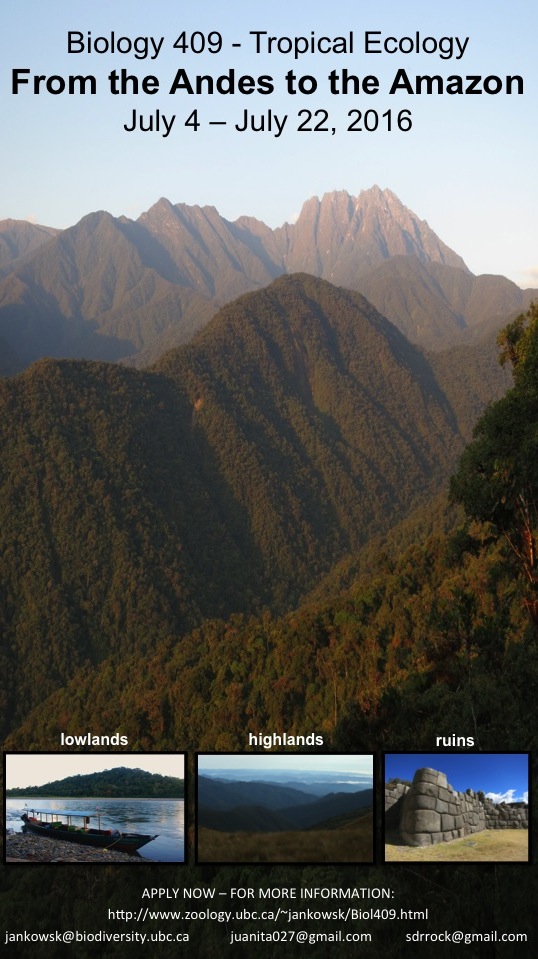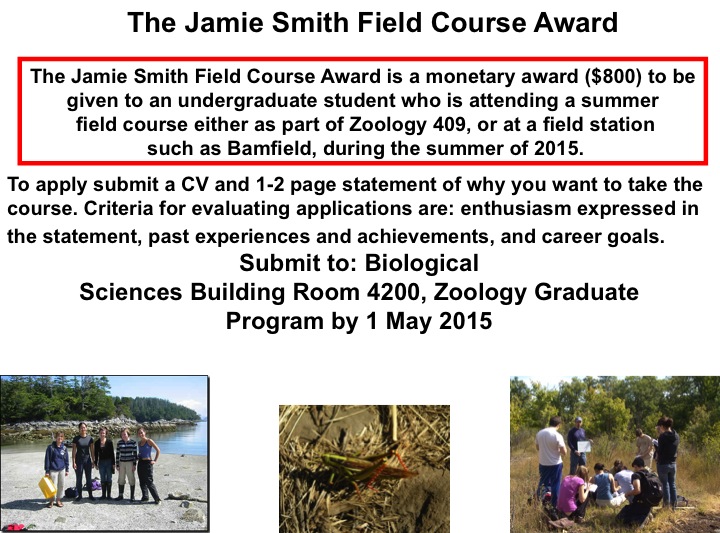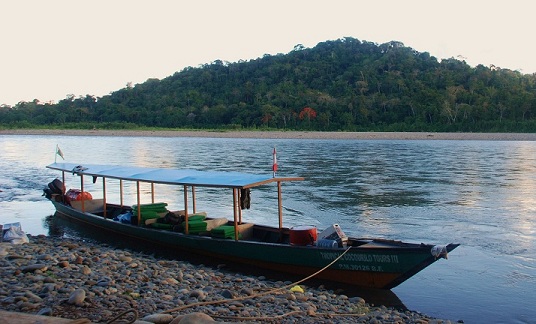Biol 409 - Tropical Ecology - From the Andes to the Amazon
Explore one of the most biologically diverse regions of the world!
INFORMATION SESSION: Will be held
on Friday, April 1st at 5pm in Biodiversity 224 (2nd floor). For your reference, a link to the ppt slides for the first info session (pdf).
Note: we are updating this page regularly, so please check back often for more details...
Where are we going?
Manu Biosphere Reserve, Southeastern Peru
When is the course?
July 4th - July 22nd, 2016
What will students do during the course?
Students will explore how species and habitats shift along one of the
most diverse biological gradients on the planet and consider the
various threats and conservation challenges in the region.
APPLY FOR THE JAMIE SMITH FIELD COURSE AWARD: Submit applications by
May 1st to BioSci 4200, see description below (to be updated).
Course Description
The field course will be held in southeastern Peru, and we will
explore Manu Biosphere Reserve and surrounding areas. The course will
run for three weeks
(July 4th - July 22nd, 2016). During this course you will be exposed to various ecosystems from the highest elevations
of the Andes and down the eastern slope, starting wtih Cusco and descending into the Amazon
basin, where we will visit the remote field station of Cocha Cashu. We will
also have a chance to see Machu Picchu and other ruins near Cusco.
Students
will conduct indepedent and group research projects during the course,
using data collected at each station and comparing
data across the gradient.
Designing and carrying out these projects, as
well as analyzing and presenting data, will be important components of student evaluation.
To
emphasize and appreciate natural history of tropical species, there
will be a field identification portion – e.g., species reports
– where students are assigned a species of plant or animal. When we
encounter this species in the field, the student should be ready to
present their
species to the rest of the group.
Readings: A series of tropical ecology and conservation papers and book chapters will be assigned
prior to the course. These will be available in a bound
booklet for students.
Instructors
Dr. Jill Jankowski is a tropical ecologist in the Zoology
Department at UBC. Her research focuses on questions of species
diversity and distributions, particularly with birds in tropical
regions. Jenny Munoz and Santiago David are graduate students in the
Jankowski lab. Jill has been working in Peru and other Neotropical
regions for ten years. Jenny and Santiago are Colombian (Paisas) and have been conducting field work in the tropics with birds for many years and in Peru for over five years.
Email contacts for instructors: Jill:
jankowsk(at)biodiversity(dot)ca, Santiago: sdrrock(at)gmail(dot)com,
Jenny: juanita027(at)gmail(dot)com
Costs
Trip costs include airfare from Vancouver to Cusco, lodging,
food and ground or boat transportation from Cusco to and from each of
the stations. We will try our best to keep costs as low as possible,
but you should expect to pay around $2000 for the trip, in addition to
airfare. Round trip tickets from Vancouver to Cuzco are just under
$1000 if tickets are purchased far enough in advance. The cost per
student also depends on the currency exchange rate during the summer
(here's hoping that the CAD bounces back) and the number of students
attending (with more students the per individual cost will be reduced
with shared food and transportation costs).
Logistics and Field Stations
Logistical support and travel will be provided by Pantiacolla Tours.
This agency has a well developed website, for your reference:
http://www.pantiacolla.com/
To learn more about some of the field stations we will visit, check out
this website on our research in Manu National Park and also the website
for Cocha Cashu Biological Station.
http://www.zoology.ubc.ca/~jankowsk/Manu_Project.html
http://cochacashu.sandiegozooglobal.org/









